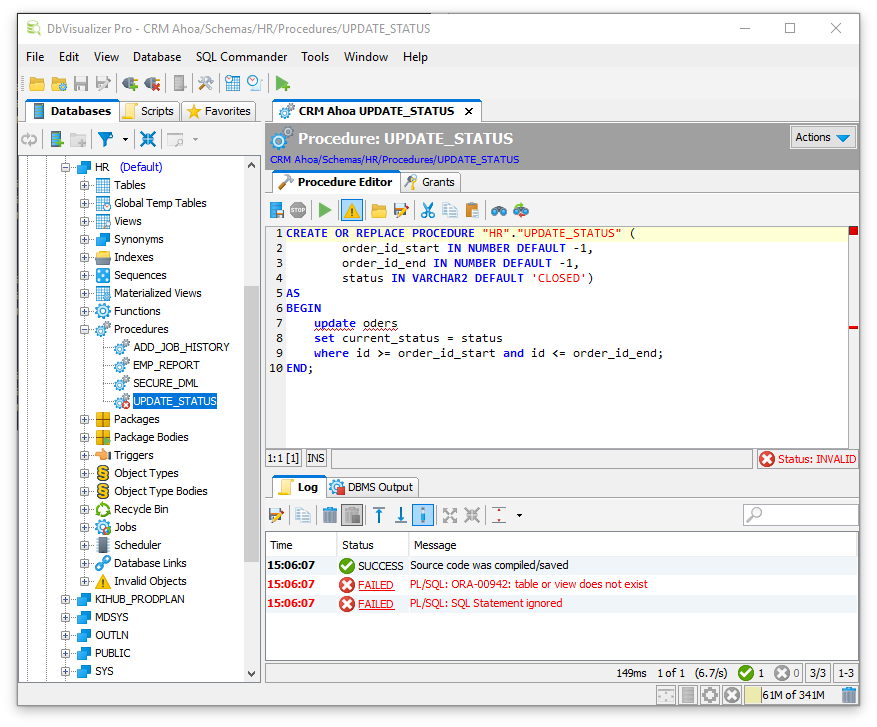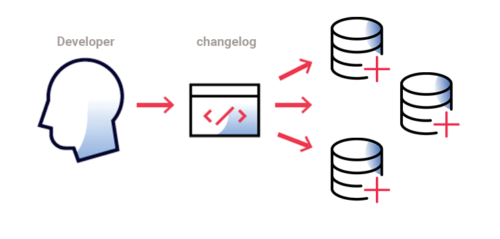
Database DevOps tools can help developers automate and orchestrate database changes, resulting in enhanced collaboration, increased reliability and accelerated deployments in software development. This guide will break down the following top database DevOps tools in terms of features, pros, cons and pricing:
Jump to:
DbVisualizer is a powerful, versatile and secure multi-platform database management tool. It is ideal for developers seeking a tool to help them work with databases to create and maintain applications.
Some of DbVisualizer’s top features include:
DbVisualizer helps developers spend less time on manual coding tasks and more time on problem-solving. The database programming tool’s powerful SQL editor offers simple coding via visual query builders, intelligent autocomplete, variables and more.
Database management is another DbVisualizer feature worth mentioning. The database development tool lets you connect to the most widely used data sources, work with their custom object types and more directly in the client. It also has visualization and optimization tools to help developers work smarter and faster.
DbVisualizer makes data management easy thanks to features like inline data editing, query tools, simple data visualizations and powerful exports. It also gives you full workflow control via configurations for UI themes, key bindings, window layouts, mark scripts, etc. Regarding security, the database development tool lets developers set user permissions, encryption, strong local passwords and other configurations to meet the toughest standards.
DbVisualizer’s pros include:
DbVisualizer is easy to use, and its intuitive interface makes navigating the database programming tool a cinch. Many users like the fact that the DbVisualizer is updated regularly. And its ability to connect to multiple database engines on a single IDE is another plus.
DbVisualizer’s cons include:
Some users noted that importing data from text files is a DbVisualizer weakness, and exporting files is rather clunky. The database DevOps tool could benefit from better themes/modernization, and its find-and-replace functionality could be easier to use.
DbVisualizer pricing is as follows. Beyond the pricing below, the developer tool also offers volume discounts for larger software development teams:
DbVisualizer’s Free plan comes with a configurable UI, monitoring, SQL history, references graphs, connection management, SSH, generic JDBC support and extended database-specific support. The Pro plan adds table management, a table data viewer/editor, procedure, function, package and trigger, database scheduling, events and jobs, table import/export, query builder, client-side commands, charts and a command line interface.

Toad DevOps Toolkit tackles the problem of database development bottlenecks in Agile DevOps workflows. It lets developers integrate Oracle database change management into their DevOps workflows with ease to eliminate bottlenecks and accelerate project completion without compromising performance, reliability or quality.
Some of Toad DevOps Toolkit’s most noteworthy features include:
Teams can meet their deployment deadlines using Toad DevOps to synchronize database and application changes within their DevOps processes. Toad DevOps Toolkit works with Jenkins, Bamboo and other automation tools to include database development/deployment as part of existing CI/CD processes. Developers can enjoy better code quality via PL/SQL testing, static code reviews, database, schema and data compare and script execution. Toad DevOps also integrates with many CI/CD tools, including Bamboo, Jenkins, etc., to keep developers from being locked into a single solution.
Strengths of Toad DevOps Toolkit include:
Installing Toad DevOps is quick and painless. Using the database DevOps tool is quite simple as well. Toad DevOps’ enterprise-level tech support ensures any questions get answered promptly, and its DevOps integrations give developers plenty of flexibility when choosing which CI/CD tools to work with.
Toad DevOps Toolkit’s weaknesses include:
Some have reported slow load times for Toad DevOps Toolkit, and its processing speed could use a boost. Since it is best for those working with Oracle Database, this could be considered a lack of flexibility and seen as another downside.
The Toad DevOps Toolkit comes with a free trial. To see how much the programmer tool costs, you will need to go here to request pricing.

Liquibase is an open-source database change management tool. By automating the database change process, it lets developers code faster, collaborate with ease and deliver with confidence on a continuous basis.
Some of Liquibase’s highlighted features include:
Liquibase supports over 50 databases. Developers can use the DevOps tool to automate database change deployments via CI/CD pipelines. Its changelog tracks the history of database changes. This gives developers insight into what changes were made and when. With support for version control, Liquibase lets you track changes to the changelog and revert to past versions if needed.
If you need to move from one database to another, Liquibase can help with its data migration capabilities. And if you need extra functionality, you can get it by integrating Liquibase with popular third-party developer tools.
Liquibase’s advantages include:
Liquibase’s open-source version is a plus for developers seeking a free database management tool with basic features. It integrates seamlessly with CI/CD pipelines and minimizes common deployment errors via automation. Another Liquibase pro is how it promotes team collaboration through its changelog files, allowing multiple developers to work on the same project simultaneously without conflicts.
Liquibase’s disadvantages include:
Liquibase could use more extensive documentation, especially when it comes to migrating from other developer tools. The documentation issue is compounded by Liquibase’s slow support. And if you plan on working with large databases, you may expect slow performance.
Liquibase is offered in open-source and Pro versions. The open-source version lets developers version, track and deploy database changes for free. The Pro version, which comes with a free trial, offers observability, agility and governance for SQL and NoSQL databases.
Choose the open-source version of the developer tool, and you get native SQL dialect, preconditions, rollback, change preview/dry run, standard JDBC and community support.
Choose the Pro version of the developer tool, and you get enhanced features like advanced stored logic, targeted rollback, advanced diff/drift detection, governance and security automation and standard support.
Go here to learn more about Liquibase pricing or start a free trial.
When shopping around for database DevOps tools, several factors must be considered. If your software development team is on a limited budget, you may want to consider an open-source programmer tool that is free to use or has a free plan with basic features. If such an option is unavailable, you must shop around until you find a database DevOps tool that fits your budget.
User-friendliness is another important factor to consider, as you want a programmer tool with an intuitive interface that is easy to navigate and use. Solid customer support, documentation, customization, extensibility and scalability are other characteristics to look for, as is compatibility with your database systems. Some features to look for in your ideal database DevOps tool include automated testing and deployment, version control integration, CI/CD support, script management, team collaboration, performance monitoring, rollback and recovery and schema and data migration.
Incorporate the database DevOps tools listed above into your software development process, and your team can significantly increase its collaboration, efficiency and delivery speed.
Before choosing any programmer tool, make sure it fits your team’s specific needs in terms of budget, user-friendliness and features.